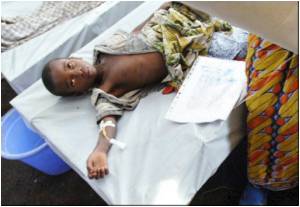
Cholera specialist Professor Renaud Piarroux spoke to AFP on his return from Haiti, where he conducted a study for the Haitian government. He warned that the epidemic could yet cause sickness in 200,000 people.
"It started in the centre of the country, not by the sea, nor in the refugee camps. The epidemic can't be of local origin. That's to say, it was imported," he told AFP, without directly fingering the Nepalese camp.
Cholera added to the woes of the impoverished Caribbean nation, which was devastated by a massive earthquake in January that killed a quarter of a million people and left 1.3 million living in ramshackle refugee camps.
At the weekend, Haiti struggled to hold credible elections amid the chaos left by the double tragedy, and violent protests having broken out, pitting rival factions against each other or against UN peacekeepers.
Haitian officials say the first cases of cholera, a waterborne illness, broke out on the banks of the Artibonite river, downstream of a Nepalese UN base in Mirebalais, in the centre of the country.
Advertisement
All samples taken from the latrines, kitchens and water supply at the suspect Nepalese camp have proved negative, Mulet said.
Advertisement
But Piarroux -- who works at the University of the Mediterranean in Marseille -- told AFP that the outbreak was not linked to the earthquake devastation, and could not have come from a Haitian environmental source.
"The epidemic exploded in an extremely violent way on October 19, with several thousand cases and several hundreds deaths after many people drank the water of the Artibonite delta," he said.
The professor said the world had not seen cholera spread so quickly since an outbreak in Goma, in eastern Congo, in 1994. "We've had more than 70,000 cases, and we could easily see them hit 200,000," he warned.
"But there won't be tens of thousands of deaths, nor a sudden spike."
Cholera is caused by bacteria spread in contaminated water or food, often through faeces. If untreated, it can kill within a day through dehydration, with the old and the young the most vulnerable.
Source-AFP










